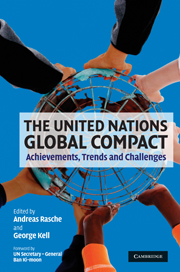Book contents
- Frontmatter
- Contents
- List of figures
- List of tables
- List of boxes
- List of abbreviations
- List of contributors
- Acknowledgements
- Foreword
- Why This Book Matters!
- The Ten Principles of the United Nations Global Compact
- 1 Introduction: the United Nations Global Compact – retrospect and prospect
- Part I Achievements, trends and challenges: reflections on the Principles
- Part II Participants and engagement mechanisms
- 7 Implementing the United Nations Global Compact
- 8 Academic institutions and the United Nations Global Compact: the Principles for Responsible Management Education
- 9 Corporate responsibility and the business school agenda
- 10 NGOs and the United Nations Global Compact: the link between civil society and corporations
- 11 Financial markets and the United Nations Global Compact: the Principles for Responsible Investment
- 12 Learning from the Roundtables on the Sustainable Enterprise Economy: the United Nations Global Compact and the next ten years
- 13 The United Nations Global Compact as a learning approach
- Part III Governance and Communication on Progress
- Part IV Local Networks: the emerging global–local link
- Glossary
- Bibliography
- Index
11 - Financial markets and the United Nations Global Compact: the Principles for Responsible Investment
Published online by Cambridge University Press: 05 February 2012
- Frontmatter
- Contents
- List of figures
- List of tables
- List of boxes
- List of abbreviations
- List of contributors
- Acknowledgements
- Foreword
- Why This Book Matters!
- The Ten Principles of the United Nations Global Compact
- 1 Introduction: the United Nations Global Compact – retrospect and prospect
- Part I Achievements, trends and challenges: reflections on the Principles
- Part II Participants and engagement mechanisms
- 7 Implementing the United Nations Global Compact
- 8 Academic institutions and the United Nations Global Compact: the Principles for Responsible Management Education
- 9 Corporate responsibility and the business school agenda
- 10 NGOs and the United Nations Global Compact: the link between civil society and corporations
- 11 Financial markets and the United Nations Global Compact: the Principles for Responsible Investment
- 12 Learning from the Roundtables on the Sustainable Enterprise Economy: the United Nations Global Compact and the next ten years
- 13 The United Nations Global Compact as a learning approach
- Part III Governance and Communication on Progress
- Part IV Local Networks: the emerging global–local link
- Glossary
- Bibliography
- Index
Summary
Introduction
The Principles for Responsible Investment (PRI) are aspirational guidelines for institutional investors on integrating environmental, social and governance (ESG) issues into investment processes and ownership practices. Launched in April 2006, the PRI Initiative has grown to become the largest investor effort focused on addressing ESG issues. As of early 2010, the initiative has over 700 signatories representing assets of US$20 trillion, constituting close to 20 per cent of global capital markets. This chapter tells the story of where the PRI Initiative came from, where it is now, and where it is heading.
Origins of the PRI
In the 1990s and early 2000s, responsible investment in all its various forms experienced strong growth. Socially responsible investment (SRI) – primarily values-driven and retail investor-focused – had a small, but established foothold in many developed markets. Shareholder activism – particularly by US pension and SRI funds – was being conducted on a range of issues from ESG disclosure to corporate governance to labour standards, with increasing numbers of shareholder resolutions filed at US companies each year. In the early 2000s, a number of large UK fund managers began to engage in dialogue with companies on ESG issues and had established dedicated teams to conduct these engagements. Clean-tech and investment in renewable energy was taking off. Climate change was emerging as a major issue and a regulatory momentum was evident.
During this period, the debate around environmental and social issues started to shift from questions of ethics to questions of good governance, long-termism, risk management and emerging opportunities.
- Type
- Chapter
- Information
- The United Nations Global CompactAchievements, Trends and Challenges, pp. 195 - 214Publisher: Cambridge University PressPrint publication year: 2010
- 4
- Cited by

